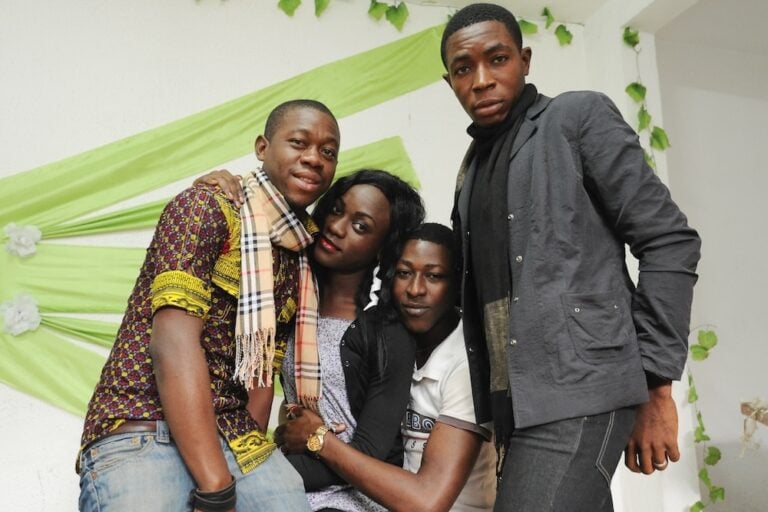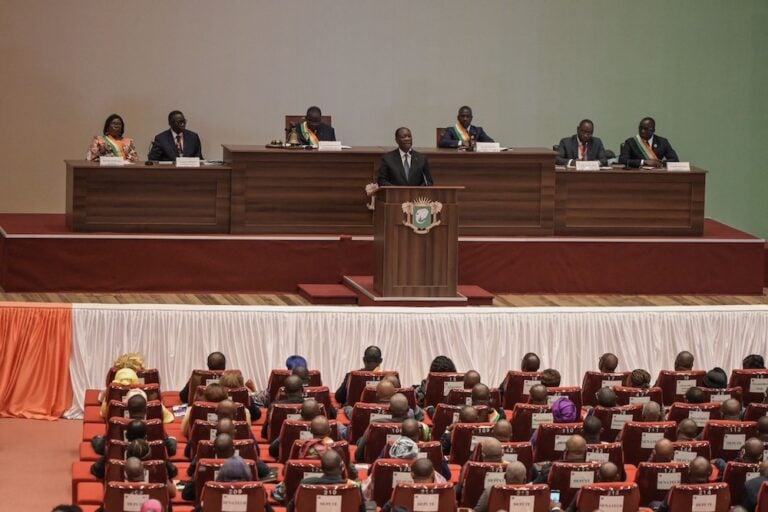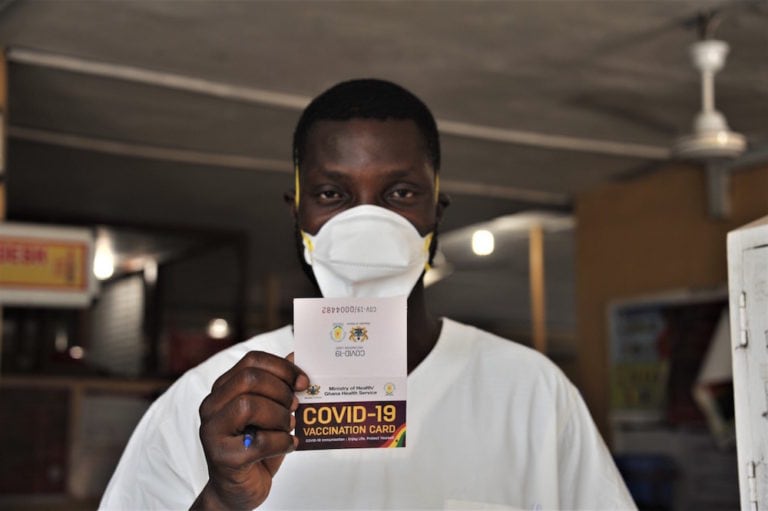(RSF/IFEX) – The following is a 24 January 2006 RSF press release: Reporters Without Borders is outraged at the way journalists were treated when demonstrators claiming to support President Laurent Gbagbo seized control of the streets of Abidjan from 16 to 19 January 2006. In a grim week for press freedom, at least four journalists […]
(RSF/IFEX) – The following is a 24 January 2006 RSF press release:
Reporters Without Borders is outraged at the way journalists were treated when demonstrators claiming to support President Laurent Gbagbo seized control of the streets of Abidjan from 16 to 19 January 2006. In a grim week for press freedom, at least four journalists were physically attacked, many were threatened with death or rape, many others were subjected to extortion, a radio station was ransacked and the state TV broadcaster, RadioTélévision Ivoirienne (RTI), was taken over.
“No lesson was learned from RTI’s takeover by the Young Patriots in November 2004,” Reporters Without Borders said. “The international community offered impunity to the press freedom predators and they repeated their offence. We therefore urge the United Nations, which condemned these events in firm and pertinent terms in New York, to quickly establish a serious programme for implementing its position in Côte d’Ivoire.”
16-17 January – 48 hour siege
The barricades began being thrown up at dawn (local time) on 16 January. In response to calls from several pro-Gbagbo organisations, young demonstrators built and manned checkpoints, stopping and searching cars and extorting money from drivers. Groups gathered outside the French embassy, the United Nations Operation in Côte d’Ivoire (UNOCI), and the barracks of the French 43rd Marine Infantry Battalion, which is part of a French peacekeeping presence known as the Licorne Force. The goal was to force all the UN-mandated foreign troops to leave Côte d’Ivoire after the International Working Group – which was set up by the African Union, with UN support, to monitor the transition – recommended not extending the period of the Ivorian parliament, which expired on 16 December 2005.
Several hundred pro-Gbagbo Young Patriots began gathering outside RTI headquarters in the district of Cocody at midday. A group led by Serge Koffi, the head of the Student and School Federation (FESCI), by Ferdinand “Watchard Kédjébo” Kouadio, the head of the National Committee for the Liberation of Bouaké (CNLB), and by Thierry Legré, one of the leaders of the Alliance of Young Patriots, demanded the right to make a statement live on the air. RTI deputy director-general Aka Sayé Lazare refused, but offered to broadcast a pre-recorded statement. Negotiations began under the authority of the armed forces chief of staff, Gen. Philippe Mangou, and the head of the security operations command centre (CECOS), Col. Georges Guiai Bi Poin.
Meanwhile, after a crisis meeting with President Gbagbo and Prime Minster Charles Konan Banny at the president’s home in Cocody, interior minister Joseph Dja Blé and defence minister René Aphing Kouassi went to RTI headquarters to record a message calling for calm. They were joined by deputy communication minister Martine Coffi Studer. The three ministers installed themselves in the director-general’s office.
Learning of the three ministers’ presence and faced by the continuing refusal of RTI management to bow to their demands, the leaders of the demonstrators threatened to call on the Young Patriots massed in the courtyard. Several demonstrators forced their way onto the set in Studio A while David Mobio was presenting the 1 p.m. news programme. They ejected Mobio from his seat and demanded to make a statement, but the broadcast was immediately suspended. It resumed only after the Young Patriots had left the studio. Mobio ended the programme saying: “May God bring peace to this country.”
Emboldened by the army chief’s apparent personal support and by the passivity of his soldiers, the Young Patriots in RTI’s courtyard insulted and threatened the station’s journalists and other employees, calling them “rebels with cushy jobs.” A well-known woman journalist who has often been threatened by the pro-Gbagbo youth in the past was actively sought by some of the demonstrators, who said they were going to “rape her.” She was absent that day.
The demonstrators stayed in the courtyard until the 8 p.m. news programme, when their recorded message was broadcast. They then began organising a siege of the building, installing a makeshift camp outside the perimeter wall.
18 January – RTI taken by storm
There was a dramatic development at 4 a.m. on 18 January. The soldiers guarding the RTI building opened the gates. The Young Patriots rushed through and forced their way into the studios where they threatened the technicians present and got them to broadcast a message by Koffi, urging all young people to take to the streets to demand the departure of foreign troops and “our country’s complete liberation.” Koffi also claimed that he had “taken” the TV station.
After the 1 p.m. news programme, the leaders of groups claiming to support Gbagbo were back on the air issuing calls for “peaceful” demonstration outside the “symbols of the occupation,” namely the French 43rd Marine Infantry Battalion, the French embassy, RTI and the Hotel Sébroko (UNOCI headquarters). The messages delivered on camera were almost identical. They called on people to “take to the streets” to “force UNOCI and Licorne to leave.” Those who spoke one after another were Damanan Pickass, the former head of the youth wing of the ruling Ivorian Popular Front (FPI), Eugène Djué, the head of the Union of Patriots for the Total Liberation of Côte d’Ivoire (UPLTCI), Geneviève Bro Grébé, head of the Women Patriots, and Alfred M’Bra N’Goran, the secretary-general of the Collective of Political Parties Supporting the President.
In Daloa, a town in the centre of the country, the community radio station Radio Tchrato-Daloa was stormed by the local Young Patriots after the management refused to broadcast an appeal for an attack on the local UN base. The demonstrators ransacked the station and wrecked equipment.
Abidjan journalists who do not belong to the pro-Gbagbo camp made themselves scarce. The places normally frequented by the opposition press were deserted. Many members of the RTI management stopped going to work. Reporters Without Borders issued a release at the end of the day expressing its outrage that “calls for insurrection have again been broadcast by the state-owned RadioTélévision Ivoirienne (RTI) under threat from demonstrators claiming to be the supporters of President Laurent Gbagbo.” The release recommended that “the installations of RTI and RCI should be made secure or, failing that, they should be taken off the air.”
The 8 p.m. news programme screened long sequences of calls for popular “mobilisation” accompanied by favourable comments.
To view the full press release online go to:http://www.rsf.org/article.php3?id_article=16263


